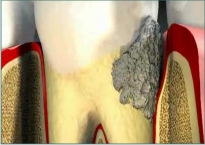 Heratsi Branch
Heratsi Branch
 Heratsi Branch
Heratsi Branch
 Heratsi Branch
Heratsi Branch
Flap Surgery.
Surgery might be necessary if inflammation and deep pockets remain following treatment with deep cleaning and medications. A dentist or periodontist may perform flap surgery to remove tartar deposits in deep pockets or to reduce the periodontal pocket and make it easier for the patient, dentist, and hygienist to keep the area clean.
This common surgery involves lifting back the gums and removing the tartar. The gums are then sutured back in place so that the tissue fits snugly around the tooth again. After surgery the gums will heal and fit more tightly around the tooth. This sometimes results in the teeth appearing longer.
Bone and Tissue Grafts.
In addition to flap surgery, your periodontist or dentist may suggest procedures to help regenerate any bone or gum tissue lost to periodontitis. Bone grafting, in which natural or synthetic bone is placed in the area of bone loss, can help promote bone growth. A technique that can be used with bone grafting is called guided tissue regeneration.
In this procedure, a small piece of mesh-like material is inserted between the bone and gum tissue. This keeps the gum tissue from growing into the area where the bone should be, allowing the bone and connective tissue to regrow. Growth factors – proteins that can help your body naturally regrow bone – may also be used. In cases where gum tissue has been lost, your dentist or periodontist may suggest a soft tissue graft, in which synthetic material or tissue taken from another area of your mouth is used to cover exposed tooth roots.
Since each case is different, it is not possible to predict with certainty which grafts will be successful over the long-term. Treatment results depend on many things, including how far the disease has progressed, how well the patient keeps up with oral care at home, and certain risk factors, such as smoking, which may lower the chances of success. Ask your periodontist what the level of success might be in your particular case.
How can I keep my teeth and gums healthy?
Brush your teeth twice a day (with a fluoride toothpaste).
Floss regularly to remove plaque from between teeth. Or use a device such as a special brush or wooden or plastic pick recommended by a dental professional.
Visit the dentist routinely for a check-up and professional cleaning.
Don’t smoke
Can gum disease cause health problems beyond the mouth?
In some studies, researchers have observed that people with gum disease (when compared to people without gum disease) were more likely to develop heart disease or have difficulty controlling blood sugar. Other studies showed that women with gum disease were more likely than those with healthy gums to deliver preterm, low birth weight babies. But so far, it has not been determined whether gum disease is the cause of these conditions.
There may be other reasons people with gum disease sometimes develop additional health problems.
For example, something else may be causing both the gum disease and the other condition, or it could be a coincidence that gum disease and other health problems are present together.More research is needed to clarify whether gum disease actually causes health problems beyond the mouth, and whether treating gum disease can keep other health conditions from developing.
In the meantime, it’s a fact that controlling gum disease can save your teeth – a very good reason to take care of your teeth and gums.

